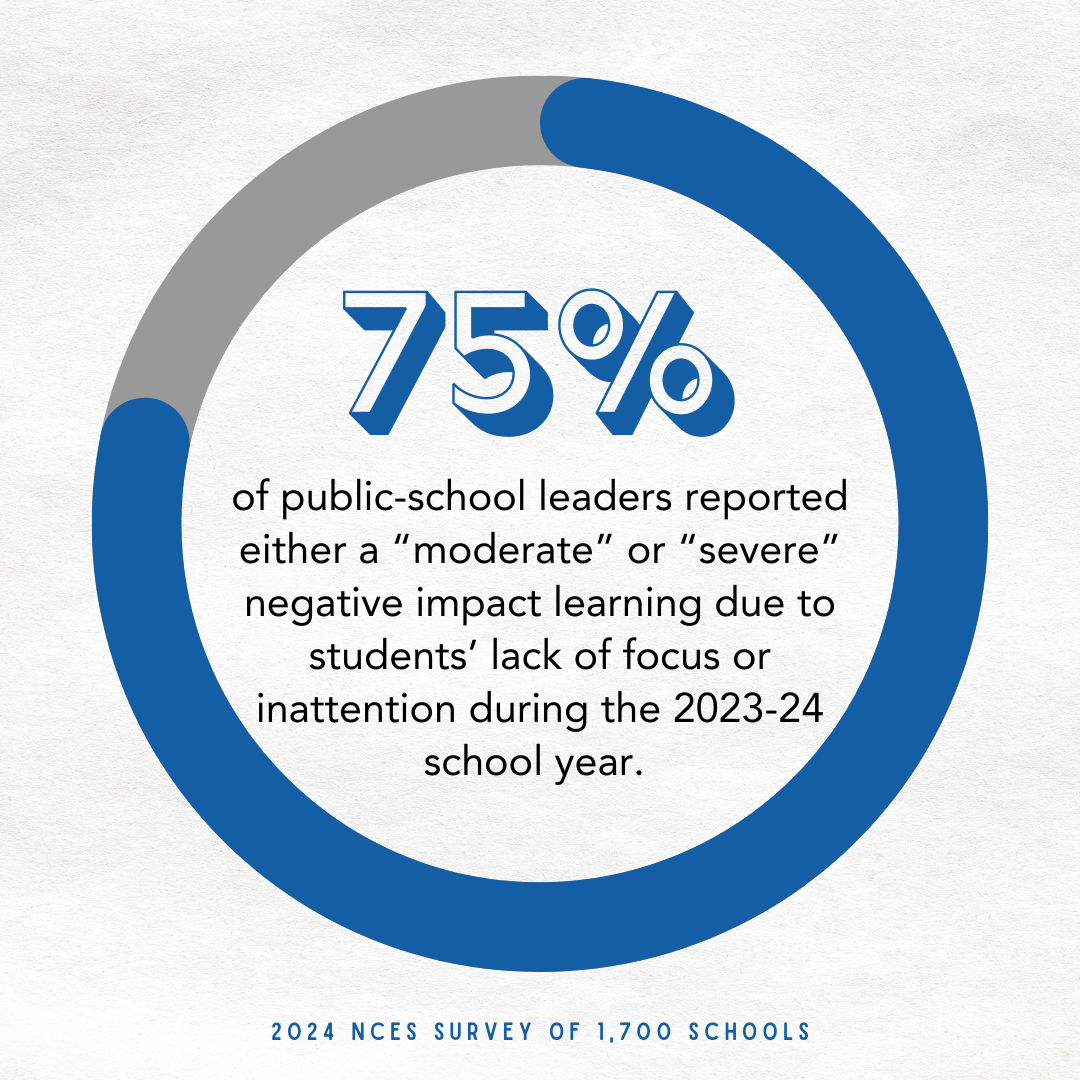Leveraging restorative practices to increase student engagement
As schools across the United States continue to grapple with the lingering impacts of the COVID-19 pandemic on student outcomes, leaders in education have immense leverage with stakeholders in framing our approach to addressing persistent student and educator needs. This is highlighted in recent (2024) COVID-19-focused research from the National Center for Education Statistics (NCES). Summarizing survey responses from more than 1,700 K-12 schools in all U.S. states, the District of Columbia, and outlying areas, more than 25% of respondents reported that focus and attention issues amongst students had a “severe negative impact on learning” in the 2023-2024 school year. Agreement rose to 75% when including a “moderate or severe negative impact on learning.”
As many leaders have now internalized, thanks to Stanford University psychologist Carol Dweck's seminal work around growth mindset (2006), when we focus on variables within our locus of control, we curate a sense of agency and build a growth (as opposed to a fixed) mindset. Leaning upon this language, school leaders who treat focus and attention as social and emotional competencies to be fostered within rigorous and supportive school and classroom climates build agency among students and teachers. In contrast, those who persist in focusing on the negative impacts of the pandemic as having caused permanent damage to an entire generation of children risk undermining educators’ sense of agency, limiting our creativity in shaping our response and reinforcing deficit views of children.
In addition to treating focus and attention as skills that are responsive to instruction, a holistic and sustainable response to recent collective disruptions in schooling also requires that we better integrate the lived experiences of students as rich sources of curricular connection. These funds of knowledge (Gonzalez et al., 1992) are the heart of culturally responsive teaching practices and are reliant on schoolwide rituals and routines to build strong relationships with and between learners (teachers and students alike). The use of restorative practices in schools supports the curation of these funds of knowledge by bringing together the pieces needed to create a school climate where the collective experience is positive and built on mutual trust and a sense of safety.
Here, Zaretta Hammond explicitly reminds us of this connection:
Culturally responsive teaching is about tapping the schema, or the funds of knowledge, that the student brings in… As a teacher, I need to recognize, honor, and actually use students' funds of knowledge to make learning sticky… The reality is that all our students learned something during the pandemic. The problem is that we're not leveraging that. So, answering the question of how do we leverage that home-based or community-based learning becomes the starting point for how we get back to subject-area content. (Rebora, 2021).
Schools that are designed around the development of these relationships within our learning communities can curate these connections, increase curricular relevance, and sustain student focus and attention skills. Restorative practices are central to building, sustaining, and repairing these relationships within schools. The IIRP’s Whole-School Change program provides professional development to all educators and staff within a schooling environment, it seeks to give power back to the educators and students, that power that the pandemic had taken from them. Through instruction and coaching, it provides the basis for creating mental safety after coming out of a traumatic nationwide event. It provides a space where relationships can be formed and renewed with an increased sense of agency, choice, and inclusion. At the IIRP, our graduate education courses, continuing education opportunities, and Whole School Change program equip classroom, school, and district leaders with the skills needed to build agency with stakeholders, to continue to support each other in response to the unprecedented events of the COVID-19 pandemic, and to develop our institutional resilience in preparation for what is to come.
References
Berger, R. (2021, March 20). Our kids are not broken. The Atlantic. https://www.theatlantic.com/ideas/archive/2021/03/how-to-get-our-kids-back-on-track/618269/
De La Rosa, J. (2024, July 18). About one-quarter of public schools reported that lack of focus or inattention from students had a severe negative impact on learning in 2023-24. National Center for Educational Statistics. https://nces.ed.gov/whatsnew/press_releases/7_18_2024.asp#:~:text=Twenty-six%20percent%20of%20public%20schools%20reported%20that%20a%20lack,or%20more%20types%20of%20tutoring.
Dweck, C. (2006). Mindset: The new psychology of success. Random House.
Mann, M. J., Smith, M. L., Krisjansson. A. L., Daily, S., McDowell, S., & Traywich, P. (2021). Our children are not “behind” due to the COVID-19 pandemic, but our institutional response might be. Journal of School Health, 91(6), 447-450. https://doi.org/10.1111/josh.13016
Moll, L. C., Amanti, C., Neff, D., & Gonzalez, N. (1992). Funds of knowledge for teaching: Using a qualitative approach to connect homes and classrooms. Theory into Practice, 31(2), 132-141. https://doi.org/10.1080/00405849209543534
Rebora, A. (2021, December 6). Zaretta Hammond on equity and student engagement. Educational Leadership, 79(4). https://ascd.org/el/articles/zaretta-hammond-on-equity-and-student-engagement
Dr. Doug Judge is an Associate Professor at the IIRP with more than 25 years of experience in education, administration, large-scale implementation in schools, social work, and youth services. His career has focused on addressing systemic inequities in influential public institutions. He shares his reaction to a recent research study from the National Center for Education Statistics (NCES) on the impact of COVID-19 on student learning.

